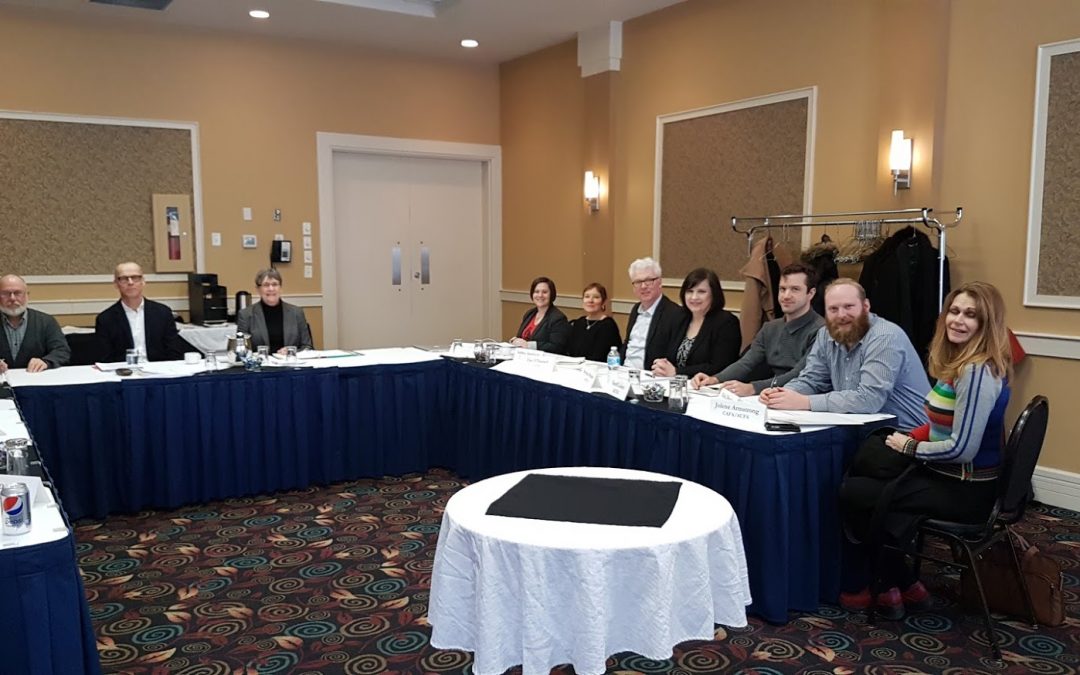Essential Services Commissioner, Gwen Gray, and Director of Mediation Services, Don Mitchell, met on Thursday Feb 8 with representatives of the Faculty Associations from the Universities of Lethbridge, Alberta, Calgary, and Athabasca. The purpose of the meeting was to discuss Essential Service Agreements (ESAs).
About Essential Service Agreements
ESAs are a new requirement in the post-secondary sector that were introduced by the provincial government as part of the changes in labour relations introduced last year as part of Bill 7.
Under the legislation (Part 2 Division 15.1 of the Code), “Essential Services” are those services
(a) the interruption of which would endanger the life, personal safety or health of the public, or
(b) that are necessary to the maintenance and administration of the rule of law or public security. (Labour Relations Code, 95.1)
Under the new law, employers and unions are required to negotiate an ESA before any formal steps can be taken to resolve a negotiating impasse (i.e. through mediation, Lockout, or Strike).
How Post-Secondary Institutions differ from other sectors
In many sectors of the economy, Essential Services are quite easy to identify, as the protection of life, health, or safety of the public or the maintenance of law and public security is written into official job descriptions. In addition, in most sectors of the economy, equipment that might prove dangerous in the event of a lockout or a strike is provided and maintained by the employer, who is then easily able to arrange for its maintenance or shut down in the event of job action.
The Post Secondary sector, however, is in this respect quite different from many other industries. Labs, for example, are commonly established by individual researchers using external research money rather than provided by the employer. This can result in highly individualised and customised equipment setups that an employer may find difficult to maintain or shut down safely without assistance or direction from the lab director or other employees.
Because researchers are responsible for establishing their own research programmes, moreover, individual members of the academic staff may have developed duties on their own initiative that impact human health or safety or affect the maintenance or administration of the rule of law or public security. This can mean a much wider exposure to potential harm–including research or service activities that are part of an employee’s duties, but take place off campus with minimal or no involvement of management in their planning. Since these duties are self-assigned, there may also be no single, centralised list of duties that must be assumed by management in the event of a lockout or strike.
Advice for establishing ESAs
Faculty Associations learned that flexibility and collaboration is necessary in developing these agreements. While it can be tempting for institutions to see them as a potential source of leverage in negotiations, it is irresponsible to take a positional approach to their negotiation (in a “positional approach,” parties understand bargaining primarily as a competition for relative advantage rather than as a way of discovering optimum solutions that benefit all involved). We were told that in some sectors, the development of ESAs has been understood as a long-term process involving cooperation between management and labour, in some cases over several negotiating cycles. We were also told of the many tools that exist for resolving impasse in ESA negotiations and of options for producing flexible ESAs that can respond to unforeseen developments and emergencies.
The Situation at the U of L
At the U of L, negotiations regarding the ESA between ULFA and the University have been caught up in our current application to the Alberta Labour Relations Board (ALRB) concerning the number of collective agreements we will be discussing this year (you can follow this case, starting here). If, as ULFA asserts, there is only one collective agreement to be negotiated for the Academic Staff, then there is also only one ESA (each bargaining unit and collective agreement requires an ESA under the new rules). If, on the other hand, as the University claims, there are two collective agreements between the U of L and ULFA, then we must also negotiate two ESAs.
Despite this disagreement, ULFA and the University have discussed ESAs in a preliminary fashion in two meetings and will explore these options in greater detail now that we have more information from the Commissioner.
As we wait to resume negotiations, ULFA is in the process of consulting with its members about any services they may need to continue to provide in the event of a lockout or strike. If you work with potentially dangerous equipment or supplies or conduct research with vulnerable populations (whether as part of self-directed research and service or as required by the university), we are very eager to hear from you. Please consider letting us know at one of our Bargaining Meet and Greet sessions.
Note
This post is intended to update the membership of ULFA about the current state of negotiations between the Union and the University. The information it contains is provided without prejudice and is intended for a general, non-specialist audience. While every effort has been made to ensure that the information this post contains is accurate, it does not represent an official legal or negotiating position. In the event of a disagreement between this post and an official notice or document, the official document is correct.

